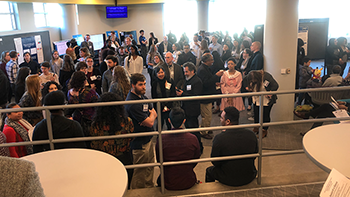Exploring the Family Stress Model (FSM) Among Recently Immigrated Hispanic Parents
Description/Abstract/Artist Statement
Parents play an important role in shaping children’s behavior by establishing boundaries and correcting inappropriate behavior, while also providing emotional support, protecting the child and providing for the child’s needs (Seay, Freysteinson, & McFarlane, 2014). Acute and chronic stressors can negatively impact parents’ ability to engage in positive parenting practices (Masarik & Conger 2017). Given the stressors associated with immigration and acculturation (Romero & Piña-Watson, 2017), there has been a recent interest in examining how these unique pressures impact parenting and children’s emotional well-being (Lorenzo-Blanco et al., 2016). Acculturative stress includes two dimensions: pressure against acculturation (pressure to preserve one’s culture by speaking one’s native language and refusing to assimilate) and pressure to acculturate (pressure to learn the language and practices of their new surroundings) (Kim, Hogge, & Salvisberg 2014). Prior research has found negative associations between acculturative stress and positive parenting (Calzadaa & O'Garaa, 2019; Marsiglia, Kiehne, & Ayers, 2016; Williams et al., 2017) by addressing the subscales of the Multidimensional Acculturative Stress Inventory (Rodriguez, Myers, Mira, Flores, & Garcia-Hernandez) as a unitary construct during their analyses. However, studies have not yet investigated the unique effects of the individual components of acculturative stress on parenting practices. This study addresses gap by examining how dimensions of acculturative stress predicts positive parenting and parental involvement.
The parent sample was drawn from a larger longitudinal study, Construyendo Oportunidades Para los Adolescentes Latinos (Schwartz et al., 2014), with recently immigrated parent-adolescent dyads residing in Los Angeles and Miami. The sample consisted of 302 recently immigrated Hispanic caregivers (Mage= 41.09, SD = 7.09; Mother = 69%). Miami families were primarily from Cuba (61%) whereas Los Angeles families were primarily from Mexico (70%). A path model was estimated in Mplus V8. (Muthén & Muthén, 1998-2017) using a Robust Maximum Likelihood Estimator to examine the unique effects of parents’ acculturative stress at Time 1 on Positive Parenting Behavior and Parental Involvement at Time 2, controlling for baseline levels. The model had good fit [χ2(2) = .403, p = .817, CFI = 1.000; RMSEA
Consistent with prior findings (Lorenzo-Blanco et al., 2016), pressure to acculturate reduces caregivers’ involvement in their adolescents’ lives. In contrast, native language pressure was associated with positive parenting. Given that caregivers are native Spanish speakers, experiencing greater native language pressure may reflect a desire to keep their children grounded in their cultural heritage. Indeed, as children gravitate toward the receiving culture (Schwartz et al., 2010), caregivers may exert more parental control (Halgunseth et al., 2006), which may be construed as “positive parenting”. Future research should examine both the origin of these stressors and take into accounts’ youths own report of family functioning.
Faculty Advisor/Mentor
Alan Meca
Presentation Type
Poster
Disciplines
Developmental Psychology | Psychology
Session Title
Poster Session
Location
Learning Commons, Atrium
Start Date
2-8-2020 8:00 AM
End Date
2-8-2020 12:30 PM
Exploring the Family Stress Model (FSM) Among Recently Immigrated Hispanic Parents
Learning Commons, Atrium
Parents play an important role in shaping children’s behavior by establishing boundaries and correcting inappropriate behavior, while also providing emotional support, protecting the child and providing for the child’s needs (Seay, Freysteinson, & McFarlane, 2014). Acute and chronic stressors can negatively impact parents’ ability to engage in positive parenting practices (Masarik & Conger 2017). Given the stressors associated with immigration and acculturation (Romero & Piña-Watson, 2017), there has been a recent interest in examining how these unique pressures impact parenting and children’s emotional well-being (Lorenzo-Blanco et al., 2016). Acculturative stress includes two dimensions: pressure against acculturation (pressure to preserve one’s culture by speaking one’s native language and refusing to assimilate) and pressure to acculturate (pressure to learn the language and practices of their new surroundings) (Kim, Hogge, & Salvisberg 2014). Prior research has found negative associations between acculturative stress and positive parenting (Calzadaa & O'Garaa, 2019; Marsiglia, Kiehne, & Ayers, 2016; Williams et al., 2017) by addressing the subscales of the Multidimensional Acculturative Stress Inventory (Rodriguez, Myers, Mira, Flores, & Garcia-Hernandez) as a unitary construct during their analyses. However, studies have not yet investigated the unique effects of the individual components of acculturative stress on parenting practices. This study addresses gap by examining how dimensions of acculturative stress predicts positive parenting and parental involvement.
The parent sample was drawn from a larger longitudinal study, Construyendo Oportunidades Para los Adolescentes Latinos (Schwartz et al., 2014), with recently immigrated parent-adolescent dyads residing in Los Angeles and Miami. The sample consisted of 302 recently immigrated Hispanic caregivers (Mage= 41.09, SD = 7.09; Mother = 69%). Miami families were primarily from Cuba (61%) whereas Los Angeles families were primarily from Mexico (70%). A path model was estimated in Mplus V8. (Muthén & Muthén, 1998-2017) using a Robust Maximum Likelihood Estimator to examine the unique effects of parents’ acculturative stress at Time 1 on Positive Parenting Behavior and Parental Involvement at Time 2, controlling for baseline levels. The model had good fit [χ2(2) = .403, p = .817, CFI = 1.000; RMSEA
Consistent with prior findings (Lorenzo-Blanco et al., 2016), pressure to acculturate reduces caregivers’ involvement in their adolescents’ lives. In contrast, native language pressure was associated with positive parenting. Given that caregivers are native Spanish speakers, experiencing greater native language pressure may reflect a desire to keep their children grounded in their cultural heritage. Indeed, as children gravitate toward the receiving culture (Schwartz et al., 2010), caregivers may exert more parental control (Halgunseth et al., 2006), which may be construed as “positive parenting”. Future research should examine both the origin of these stressors and take into accounts’ youths own report of family functioning.


